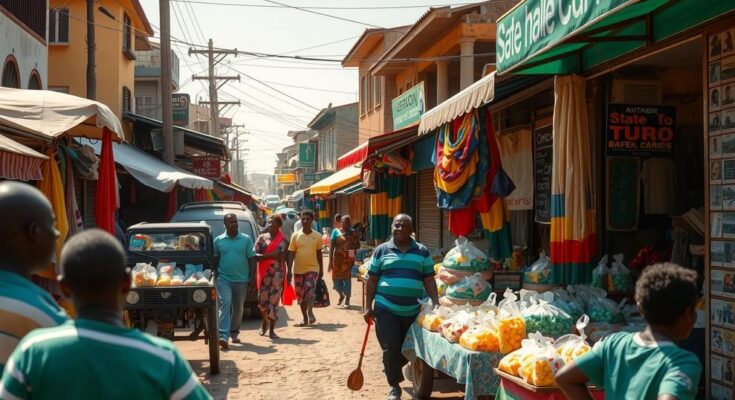The political unrest in Zimbabwe could bring challenges to South Africa, as many Zimbabweans consider migrating for better opportunities amid poor conditions. Calls for President Mnangagwa to extend his term are creating internal divisions within the ruling party, which may further destabilize the region and increase migrant flow. Economic implications for South Africa are also significant, as political insecurity in Zimbabwe affects bilateral trade.
The political upheaval in Zimbabwe, fueled by calls for President Emmerson Mnangagwa to resign, poses potential challenges for South Africa. Despite the relatively higher levels of poverty and unemployment in Zimbabwe, many citizens continue to view South Africa as a land of opportunity. Recent statistics from the Department of Home Affairs indicating a surge in deportations from South Africa since 2020/21 have not dissuaded Zimbabweans from seeking better prospects abroad.
Individuals like Sothini Ncube, a vendor in Bulawayo with an honors degree in psychology, express their despair over the current conditions in Zimbabwe, citing the lack of job opportunities and essential services. Ncube articulates the difficult choices faced by many: “Why should I stay home when it’s clear 2025 and beyond will be a waste for me? I would rather go back to SA and take up menial jobs,” emphasizing the dire situation that compels many to migrate.
The political uncertainty, particularly within the ruling Zanu-PF party, might encourage more Zimbabweans to consider moving to South Africa. Stevenson Dlamini, a Zimbabwean economist, underscores the implications of Zimbabwe’s instability for South Africa, noting that it could exacerbate pressure on the country’s public services. Dlamini states, “SA has on numerous occasions struggled with unregulated Zimbabwean economic and political refugees.”
Zimbabwe’s internal political dynamics came into focus during the October conference where factions aligned with Mnangagwa proposed extending his term beyond 2028. These proposals include amending the constitution to facilitate his continuance in power until 2034, despite Mnangagwa’s insistence that he intends to adhere to constitutional term limits.
Blessed Geza, a former Zanu-PF central committee member, has emerged as a prominent figure opposing Mnangagwa’s proposed term extension. Following his expulsion from the party, Geza has called for mass protests against the president, advocating for his deputy Constantino Chiwenga to succeed him. Zanu-PF spokesperson Christopher Mutsvangwa, however, has accused Chiwenga of harboring presidential ambitions, labeling him unfit for leadership.
In an effort to consolidate power and mitigate potential dissent ahead of planned demonstrations, Mnangagwa promptly restructured key security roles within the government. Significant leaders have been replaced, signaling a decisive move to safeguard the regime against perceived threats to stability. Mutsvangwa later confirmed these changes were essential to prevent any unconstitutional shifts in governance.
Overall, the escalating political tension within Zimbabwe is poised to affect South Africa significantly, particularly concerning the influx of Zimbabweans seeking refuge amidst the burgeoning instability.
The intensifying political strife in Zimbabwe, characterized by divisions within Zanu-PF regarding President Mnangagwa’s potential term extension, is likely to have profound implications for South Africa. As conditions in Zimbabwe compel its citizens to migrate in search of better opportunities, South Africa may face increased challenges in managing the influx of refugees and undocumented migrants. Additionally, ongoing instability within Zimbabwe could adversely affect economic relations, given the two nations’ interdependent dynamics.
Original Source: www.newzimbabwe.com




